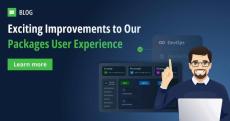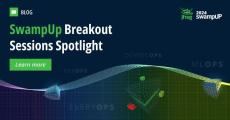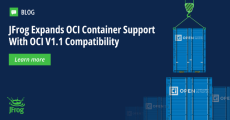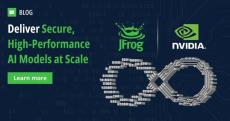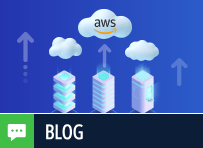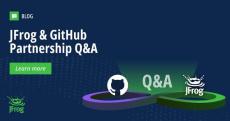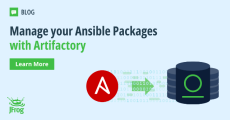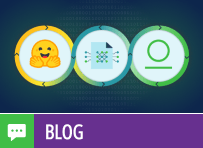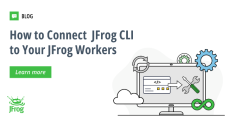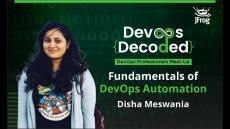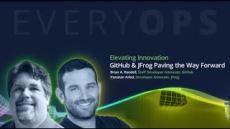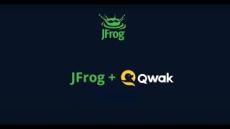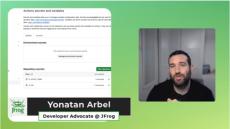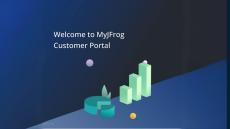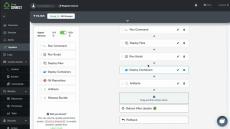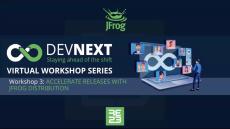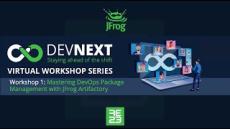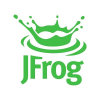|
By Brian Chang
I think we can all agree that, in general, different users have different needs. For instance, we’ve found that developers generally use Artifactory to find, select, and then install packages into their development environment, while administrators tend to use Artifactory for troubleshooting, confirming package operations, and other related analyses.
|
By The JFrog Team
swampUP 2024, the annual JFrog DevOps Conference, was unique in it’s addressing not only more familiar DevOps and DevSecOps issues, but adding specific operational challenges, stemming from the explosive growth of GenAI and the resulting need for specialized capabilities for handling AI models and datasets, while supporting new personae such as AI/ML engineers, data scientists and MLOps professionals.
|
By Brian Chang
JFrog has long supported standards widely used by developers, including OCI container images. We started with our OCI-compliant Docker registry, then followed up with dedicated JFrog Artifactory OCI repositories. In our continued commitment to developer freedom of choice, we’re excited to take another leap forward. JFrog is now fully conformant to OCI v1.1. Source: OCI Conformance Page JFrog is now fully certified to the OCI v1.1 standard.
|
By Kristian Taernhed
The AI revolution is transforming enterprises faster than you can say, “sudo apt-get install skynet.” According to McKinsey, 65% of organizations now regularly use generative AI, nearly doubling from last year. However, as developers rush to integrate AI into their products, the shift from AI proof-of-concept to production can feel like trying to assemble flat-box furniture in a hurricane.
|
By Kate Kwiatkowski
In the fast-paced, ever-evolving world of software development, the ability to seamlessly migrate and manage workloads on the cloud is a game changer. At JFrog, we’re committed to empowering organizations to achieve their DevOps, DevSecOps, and MLOps goals with speed, security, and efficiency. Migrating these workloads to the cloud offers numerous advantages, including increased scalability, cost efficiency, and improved agility.
|
By The JFrog Team
The software development industry reacted with excitement to the news about the partnership between JFrog and GitHub and its potential impact on software development operations as covered in our recent webinar.
|
By Sean Pratt
If you work with virtual machines or install and configure software on EC2 or leverage dynamic runtimes, chances are you’re also using Ansible. In fact, JFrog has supported installation via Ansible for some time. If they’re not using Red Hat, the way most organizations have managed their Ansible Collections – including Roles – is by storing them in Git repositories.
|
By Sean Pratt
When working with ML models, it’s fair to say that a model is only as good as the data it was trained on. Training and testing models on quality datasets of an appropriate size is essential for model performance. Because of the intricate link between a model and the data it was trained on, it’s also important to be able to store datasets and versioned models together.
|
By Batel Zohar
In our previous blog post, we explored JFrog Workers, a JFrog Cloud Platform service that allows you to create customized workers that can respond to events in the platform. These workers can perform various tasks, from running code to adjusting functions, giving you more flexibility and control over your workflows. Allowing you to automate processes and streamline your development pipeline in a serverless execution environment.
|
By Sean Pratt
As we delve deeper into the era of software reliance, the 2024 JFrog Software Supply Chain report emerges as required reading for developers and DevOps professionals who are at the frontline of today’s technological innovations.
|
By JFrog
Insightful stories from experts on emerging trends and technologies that will redefine DevOps in the coming years.
|
By JFrog
The world of machine learning and AI has moved out of the lab and into the critical path of nearly all software applications. JFrog brings DevSecOps best practices to AI/ML development to accelerate AI/ML initiatives with confidence.
|
By JFrog
What happens when the leaders in code management and GenAI join forces with the binary management and software supply chain security experts? Join Yonatan Arbel, Developer Advocate, JFrog and Brian A. Randell, Staff Developer Advocate, GitHub as they detail game-changing advances in the world’s top DevOps and DevSecOps platforms and how together, JFrog and GitHub are creating tectonic shifts in the development landscape.
|
By JFrog
Developers used to code. Now they manage, import, secure, build, package, deliver and monitor… the list of every “Ops” is ever-growing. As if this wasn’t enough, they are now being asked by the C-suite to work with data science and machine learning teams in a gold rush of AI and ML-enabled application delivery. In our annual swampUP kickoff, join JFrog Co-founder and CEO Shlomi Ben Haim - alongside a special guest - as we explore how developers may still start with code and CI, but are increasingly asked to hold the reins of EveryOps; building, securing and delivering alongside the machines and systems they created.
|
By JFrog
In this video we take a closer look at how JFrog and Qwak deliver a straightforward and hassle-free user experience for bringing models to production, combined with the level of trust and provenance enterprises expect from JFrog as they deliver AI-powered applications.
|
By JFrog
JFrog’s integration of OpenID Connect (OIDC) with GitHub Actions enables users to establish a trust relationship between their GitHub Actions and the JFrog Platform. The result is a more efficient and secure token management system, eliminating the need for manual token creation for each GitHub Action. In this video, Yonatan Arbel, Developer Advocate at JFrog, provides a short intro and a how-to demonstration of this integration.
|
By JFrog
MyJFrog offers seamless oversight of your company's JFrog Platform environments, providing a comprehensive dashboard for both users and administrators. With MyJFrog, you can: Try it out at: my.jfrog.com.
|
By JFrog
JFrog Connect is a modern Linux-first IoT platform designed to efficiently monitor, manage and update edge and IoT devices at scale. You can quickly register thousands of devices, organize them into logical groups, automate software updates for entire device fleets, and leverage secure tools to remotely troubleshoot devices from the comfort of your laptop. Start free at jfrog.com/connect.
|
By JFrog
Looking to supercharge your DevSecOps skills and stay at the forefront of the tech industry? DevNext is a series of four live, 90-minute hands-on workshops crafted to help you take definitive steps toward mastering the tools of the DevSecOps trade.
|
By JFrog
Watch the JFrog DevNext Artifactory workshop. The live audience experienced a real-time hands-on event to help them develop their skills with JFrog's Artifactory solution, and you can follow along with the replay.
|
By JFrog
Cloud DevOps tools offer greater flexibility, rapid deployment, cloud automation, reduced IT costs, and low upfront costs with subscription pricing. Setting up your environment with Artifactory on the cloud on your choice provides unlimited scalability allowing you to grow according to your needs and is easily achieved by using cloud storage providers (Amazon AWS, Google GCP or Microsoft Azure) in your environment with Artifactory.
|
By JFrog
Software businesses of every industry and all sizes, from small startups to large enterprises, are looking for ways to accelerate their software development process in the race to innovate and deliver their offerings to their customers ahead of their competition.
|
By JFrog
Today, we live in a very connected world, where our devices, homes and cars all communicate with each other, and every company with a product or service has the need to develop software. It is one of the primary mediums by which they strive to provide better products, services and solutions, and has become paramount to a company's success. To continuously improve their software, companies must have sound DevOps or DevSecOps practices in place.
|
By JFrog
In today's enterprises, software is your company's everyday face, whether through the desktop, the cloud, or a mobile device, to all parts of the globe. Cars are computers on wheels. Thermostats are data terminals. Banks live in your phone. In this new world, software updates serve customer's demands. Each one you deliver is your opportunity to renew - or, if botched, destroy - their trust. How can you make every update top-notch at top speed?
|
By JFrog
Over the last several years, software development has evolved from deploying products periodically to building them on an ongoing basis using CI servers. A company's end product may be built on a daily or even hourly basis. This means that DevOps must support the continual flow of code from the individual developer's machine to the organization's production environment.
|
By JFrog
Two numbers are shaking the foundations of business. What do these two figures mean to your business? They mean that, odds are your competitive landscape is irrevocably changed - already. To start, expectations for delivery speed for new products, services, and everything are faster. The new table stakes in the DevOps world have raised the bar on collaboration, cross-organizational visibility, efficiency, even company culture. Another thing these two simple stats mean is that most businesses are already there, or heading there now.
- October 2024 (4)
- September 2024 (4)
- August 2024 (1)
- July 2024 (5)
- June 2024 (4)
- May 2024 (1)
- April 2024 (4)
- March 2024 (3)
- February 2024 (6)
- January 2024 (2)
- December 2023 (3)
- November 2023 (4)
- October 2023 (3)
- September 2023 (5)
- August 2023 (2)
- July 2023 (7)
- June 2023 (3)
- May 2023 (2)
- April 2023 (2)
- March 2023 (4)
- February 2023 (8)
- January 2023 (5)
- December 2022 (9)
- November 2022 (1)
- October 2022 (3)
- September 2022 (9)
- August 2022 (6)
- July 2022 (8)
- June 2022 (7)
- May 2022 (5)
- April 2022 (3)
- March 2022 (7)
- February 2022 (16)
- January 2022 (12)
- December 2021 (22)
- November 2021 (10)
- October 2021 (14)
- September 2021 (15)
- August 2021 (14)
- July 2021 (16)
- June 2021 (26)
- May 2021 (19)
- April 2021 (11)
- March 2021 (13)
- February 2021 (23)
- January 2021 (16)
- December 2020 (15)
- November 2020 (15)
- October 2020 (20)
- September 2020 (10)
- August 2020 (15)
- July 2020 (33)
- June 2020 (15)
- May 2020 (24)
- April 2020 (15)
- March 2020 (16)
- February 2020 (7)
- January 2020 (10)
- December 2019 (6)
- November 2019 (18)
- October 2019 (6)
- September 2019 (2)
JFrog products seamlessly integrate with practically any development environment on Earth, from legacy code to the most recent containers and micro-services.
JFrog's end-to-end platform provides a fully automated pipeline for distributing trusted software releases. Connecting all developers, DevOps engineers and product owners to end devices, the JFrog Platform ensures software flows quickly and free from interruption.
End-to-End Universal DevOps Platform:
- JFrog Artifactory: The undisputed software repository leader for integrated, universal artifact management at enterprise scale.
- JFrog Container Registry: The world’s most flexible, hybrid container registry, with enterprise-grade resiliency backed by JFrog Artifactory.
- JFrog XRay: Universal security vulnerability & compliance analysis, natively integrated with Artifactory for continuous governance across the DevOps pipeline.
- JFrog Pipelines: Universally orchestrate software releases and master the entire CI/CD pipeline from code to production.
- JFrog Distribution: Secure and validate your software releases, allowing trusted, optimized software distribution on a global scale.
- JFrog Mission Control: A single access point providing a centralized dashboard to oversee your DevOps pipeline.
Universal Artifact Management for DevOps Acceleration.


